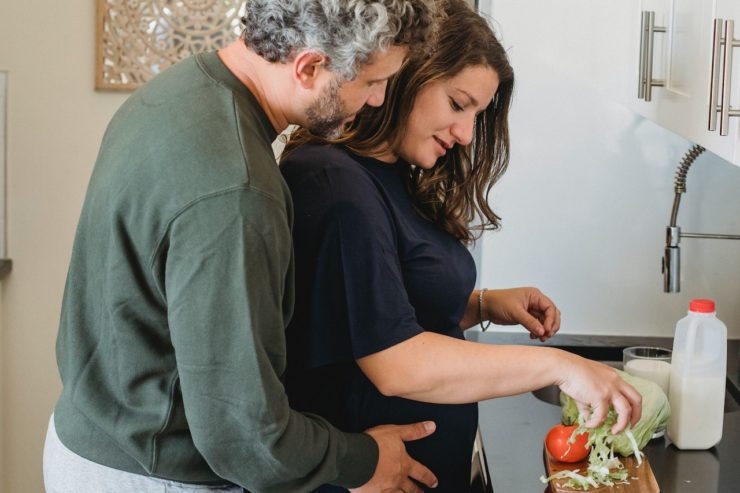 Congratulations on your pregnancy! It is a time of great change and growth for both you and your baby. As you prepare for the arrival of your little one, it is important to focus on your health and nutrition.
Congratulations on your pregnancy! It is a time of great change and growth for both you and your baby. As you prepare for the arrival of your little one, it is important to focus on your health and nutrition.
There are many essential nutrients that pregnant women need to ensure a healthy pregnancy. Come with us as we discuss the differences between folate vs folic acid: two important nutrients for expectant mothers. We will also provide some tips for maintaining a healthy pregnancy diet.
What Is Folate and Why Do Pregnant Women Need It?
Folate is a water-soluble vitamin that is found in leafy green vegetables, legumes, nuts, and fortified foods. Folic acid is the synthetic form of folate and is found in supplements and some fortified foods. Folate is important for pregnant women because it helps to prevent neural tube defects in the developing baby. The neural tube forms the baby’s brain and spinal cord.
The recommended daily folate intake for pregnant women is 600 micrograms (mcg). This can be achieved through diet or by taking a supplement that contains folate or folic acid. It is important to start taking folate before becoming pregnant and to continue throughout the first trimester. This will help to ensure that enough folate is available to the developing baby.
Foods That Are Rich in Folate
Many foods are rich in folate, including leafy green vegetables, legumes, nuts, and fortified foods. Some of the best folate-rich foods include:
- Spinach
- Kale
- Broccoli
- Lentils
- Black beans
- Oranges
- Fortified cereal
Risks Associated With Too Much Folate Intake During Pregnancy
While folate is an important nutrient for pregnant women, it is possible to have too much folate. This can occur if a woman takes supplements that contain high levels of folate or if she consumes fortified foods that contain high levels of folic acid.
Too much folate can mask a type of anemia that is caused by vitamin B12 deficiency. This can be a problem because vitamin B12 deficiency can lead to serious neurological problems. The symptoms of too much folate intake during pregnancy can include:
- Nausea
- Diarrhea
- Bloating
- Flatulence
- Abdominal cramps
- Anemia
If you are pregnant and taking a supplement that contains folate or folic acid, it is important to talk to your healthcare provider about the right amount for you. You should also be aware of the folate content of fortified foods and limit your intake of these foods if you are getting too much folate from other sources.
Benefits of Folate for Pregnant Women and Their Babies
Folate is important for pregnant women because it helps to prevent neural tube defects in the developing baby. The neural tube forms the baby’s brain and spinal cord. Folate also helps to prevent anemia during pregnancy. Anemia is a condition in which there are not enough red blood cells to carry oxygen to the tissues. This can cause fatigue and other symptoms.
Folic acid supplementation has been shown to reduce the risk of preterm birth, low birth weight, and small for gestational age infants. Folic acid may also help to reduce the risk of some congenital heart defects. Getting proper amounts of this vital nutrient can also help prevent preeclampsia and gestational diabetes.
Tips for Maintaining a Healthy Pregnancy
Eating a healthy diet is important for all women, but it is especially important for those who are pregnant. A healthy diet includes a variety of nutrient-rich foods from all food groups. Here are some tips for a healthy pregnancy:
- Eat plenty of fruits and vegetables: Fruits and vegetables are packed with nutrients that are essential for a healthy pregnancy. Aim to eat at least four servings of fruits and vegetables per day.
- Choose whole grain foods over refined grain foods: Whole grain foods contain more fiber and nutrients than refined grain foods. Choose whole grain bread, pasta, and cereal.
- Include protein at every meal: Protein is essential for the growth and development of the baby. Good sources of protein include lean meat, poultry, fish, legumes, and nuts.
- Limit processed and sugary foods: Processed and sugary foods are low in nutrients and high in calories. Limit these foods to help maintain a healthy pregnancy weight.
- Stay hydrated: It is important to stay hydrated during pregnancy. Drink plenty of water throughout the day.
In Closing: Healthy Mom and Baby
Pregnancy is a time of great change and growth for both you and your baby. As you prepare for the arrival of your little one, it is important to focus on your health and nutrition. There are many essential nutrients that pregnant women need to ensure a healthy pregnancy. This includes folate and folic acid. Getting the proper amounts of these nutrients can help to prevent birth defects, anemia, and other problems.
If you have any questions or concerns about your pregnancy diet, be sure to speak with your healthcare provider. They can provide you with individualized guidance to ensure that you and your baby are getting all of the nutrients you need.




